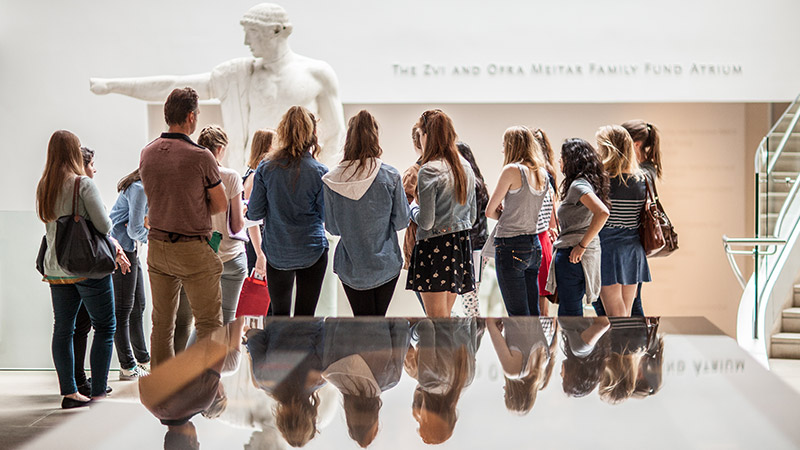UCAS code: P017869
Start dates: September 2026 / January 2027
Full time: 1 year or 2 years in sandwich mode which includes one year's full-time paid supervised work experience (a work placement).
Part time: 24 months for UK and EU students (teaching normally provided on one day or two half days each week during semesters.)
Location: Headington
School(s): Oxford Brookes Business School
Overview
A great hotel isn’t just about a clean room and a well-made bed. A successful visitor attraction is more than a good layout and interactive displays. To give guests an incredible experience, there needs to be effective leaders who keep the business profitable and make everything run smoothly. On our MSc International Hotel and Tourism Management course, we will help you acquire the skills and knowledge to be a leader in the sector.
Not many courses can take you from a novice with no prior knowledge in hospitality and tourism to a competent leader in your industry. With the assistance of our experienced academics, and the right attitude and application, it’s possible with this degree.
Our focus on employability means you’ll be exposed to the sort of organisations you want to be working for and immerse you in the industry from day one. You’ll have time to work alongside your study – perhaps as a hotel concierge or supervisor at a visitor attraction. Many of our students who work for hotels and tourism organisations during their studies are offered positions after graduation.

Why Oxford Brookes University?
-
Client project
Complete a traditional dissertation or challenge yourself and leave your comfort zone by working closely with an organisation to help address an issue they’re facing.
-
Focus on employability
From shadowing professionals to attending field visits and practitioner-led lectures, you’ll experience the industry throughout the course. You’ll expand your network and prepare for your career.
-
Learn from leaders
We’re one of the few UK universities to offer a course in hotel and tourism management. Optional modules specialise in these areas.
-
Pick your priority
Shape your study throughout the course with optional modules. It’s up to you whether you focus on operations or financial management – a choice you’re unlikely to get elsewhere.
-
Be part of The Bacchus Mentoring Scheme
The Bacchus Mentoring Scheme offers Hospitality, Tourism and Events students a range of opportunities such as mentoring, careers advice and industry engagement events, led by experienced professionals who work at some of the leading hotel groups in the world.
Course details
Start this course in January or September
You can start this course in January if a September start doesn't suit you or is not currently offered for this course.
If you start in January you will study a range of modules between January and May. During the summer months of June, July and August you will study further modules and begin work on your dissertation. Between September and December you will complete your final modules and focus on your dissertation.
Study modules
Be industry ready when you graduate
By undertaking an enterprise work placement, you can gain valuable and relevant industry experience and develop transferable skills such as communication, teamwork, networking and problem solving. A placement can help clarify your long-term career goals and may lead to a job offer after graduation (would require visa sponsorship for international students).
The WAVES (Work and Voluntary Experience Service) or Careers Office will provide you with support and advice to get ahead in your career, and help you with your CV and applications. The team has access to a wide range of small, medium and large employers that offer postgraduate student work placements.
If you wish to pursue a placement at a particular company, our WAVES team can support you in making an approach to the company. Our Careers Office can also provide you with advice on how to use professional social media channels to pitch yourself to prospective employers.
Please note: As our courses are reviewed regularly as part of our quality assurance framework, the modules you can choose from may vary from those shown here. The structure of the course may also mean some modules are not available to you.
Research
We are recognised as a centre of excellence for research in international hospitality and tourism.
Our aim is to conduct rigorous research that:
- advances academics' understanding of the management of national and international hospitality and tourism organisations and destinations
- addresses the needs of organisations and policy-makers
- informs teaching and learning practices.

Careers
This industry is different. It’s easy to get started and employers are hungry for graduates.
If you see yourself working at management level at a global hotel chain, we’ll help you get there. Your leadership skills are something that will really make you stand out to employers after you graduate.
Our graduates go on to work for leading hotel and tourism brands in a wide range of roles either in the UK or internationally. These include:
- Accor
- Compass
- Carnival
- Four Seasons
- Hilton
- Hyatt
- IHG
- Shangri-La
- Mandarin Oriental
- Marriott
- Radisson
- Sodexho
- Sol Melia
- Starwood
- TUI.
Our optional one-year work placement is a great opportunity for those who would like to gain work experience in the hotel or tourism industry after the course. We’ll help you find a placement and offer you support throughout so you make the most of this opportunity.
Student profiles
Our Staff
Dr Kate Mingjie Ji
Prior to my academic position, I worked in PricewaterhouseCoopers as a senior auditor. My professional expertise is auditing, accounting and applied finance.
Read more about KateRelated courses
Entry requirements
Specific entry requirements
A minimum of a second class honours degree (2:2) in any academic discipline, or equivalent overseas degree from a recognised institution.
This course attracts students from a wide range of backgrounds and nationalities.
Applicants who possess a diploma rather than a good degree may be eligible for entry provided they have compensatory work experience and can demonstrate career development
Please also see the University's general entry requirements.
English language requirements
If English is not your first language you will need to satisfy the university's English language requirements:
- IELTS minimum level 6.0, (with a minimum of 6.0 in reading and writing, and 5.5 in listening and speaking).
- If you have completed your undergraduate degree in the UK (at least one full year of study) you will automatically meet our English language requirements
Please also see the University's standard English language requirements.
Pathways courses for international and EU students
We offer a range of courses to help you meet the entry requirements for your postgraduate course and also familiarise you with university life in the UK.
Take a Pre-Master's course to develop your subject knowledge, study skills and academic language level in preparation for your master's course.
If you need to improve your English language, we offer pre-sessional English language courses to help you meet the English language requirements of your chosen master’s course.
English requirements for visas
If you need a student visa to enter the UK you will need to meet the UK Visas and Immigration minimum language requirements as well as the University's requirements. Find out more about English language requirements.
Terms and conditions of enrolment
When you accept our offer, you agree to the Terms and Conditions of Enrolment. You should therefore read those conditions before accepting the offer.
International qualifications and equivalences
How to apply
Application process
Tuition fees
Questions about fees?
Contact Student Finance on:
Tuition fees
The full-time fees quoted are for the taught Year 1. Fees will be charged for the placement year in Year 2 and are available on request from finance-fees@brookes.ac.uk. For approximate fee levels of the placement year see the placement fee above.
The following factors will be taken into account by the University when it is setting the annual fees: inflationary measures such as the retail price indices, projected increases in University costs, changes in the level of funding received from Government sources, admissions statistics and access considerations including the availability of student support.
How and when to pay
Tuition fee instalments for the semester are due by the Monday of week 1 of each semester. Students are not liable for full fees for that semester if they leave before week 4. If the leaving date is after week 4, full fees for the semester are payable.
- For information on payment methods please see our Make a Payment page.
- For information about refunds please visit our Refund policy page
Additional costs
Please be aware that some courses will involve some additional costs that are not covered by your fees. Specific additional costs for this course are detailed below.
Optional costs
| Additional costs | Amount (£) |
|---|---|
International Business in Practice Study Trip module (inc. accommodation for seven nights, insurance, company visits and group transportation for all activities). This fee did not include international airfare, visa application fee (if relevant), dinners and activities during your free time. |
£2250-2500 |
It’s your responsibility to cover print / binding costs where coursework submission is required. Please note that a lot of the coursework is now submitted online. |
From £30 |
| You may choose to purchase books to support your studies. Many books on our reading lists are available via the Library, or can be purchased secondhand. | £20-60 per book |
Accommodation fees in Brookes Letting (most do not include bills) |
£107-301 per week |
Accommodation fees in university halls (bills included, excluding laundry costs) |
£139-248 per week |
Graduation costs include tickets, gowning and photography. Gowns are not compulsory but typically students do hire robes, starting at £41. |
Typically £0-200 |
Students are responsible for their own travel to and from university for classes. For the 2025/26 academic year, the University is introducing an alternative subsidised travel offer for all students with further information on our Travel webpages. |
From £10 |
Funding your studies
Financial support and scholarships
Featured funding opportunities available for this course.
All financial support and scholarships
Programme changes:
On rare occasions we may need to make changes to our course programmes after they have been
published on the website. For more information, please visit our
changes to programmes page.

